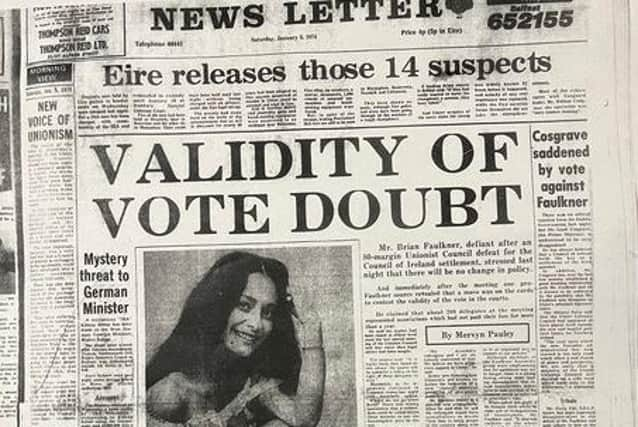Dermot Nesbitt: Remembering the Sunningdale Agreement, 50 years after the defeat of Brian Faulkner


This week, 50 years ago, was a key period for unionism.
Brian Faulkner, the last prime minster of Northern Ireland, had agreed on December 9 1973 a way forward to restore government in Northern Ireland: commonly called 'The Sunningdale Agreement'. The Stormont Parliament was suspended in March 1972 and the Westminster government brought forward proposals in March 1973 for its restoration. These proposals formed the basis for discussion and agreement as to a political way forward.
A fundamental issue was the North/South relationship. A meeting of the Ulster Unionist Party's governing body [Ulster Unionist Council] was convened on January 4 1974 to consider this matter, in particular the proposal for a 'Council of Ireland'. The Ulster Unionist Council did not support Brian Faulkner’s position and he resigned as party leader three days later. While he continued as 'chief executive’ of the new power-sharing government that was formed on January 1 1974, there followed much community turmoil – including strikes – and thus on May 30 1974 Stormont collapsed and was not restored for 25 years. At the time I acted as Brian Faulkner's Election Agent and spoke in his support at the January 41974 meeting.
Advertisement
Hide AdAdvertisement
Hide Ad

Now, 50 years later, what are my reflections? The meeting was very tense. Given the circumstances, I believe Brian Faulkner did his best to secure a way forward for the benefit of all in Northern Ireland. Regrettably, he was not supported in the negotiations by all unionists, and I believe this was to unionism's detriment. Yet, looking back, the Westminster government's proposal regarding the form of government was that the Executive could not comprise of only one party, if that party came from only one side of the community.
This proposal represented power-sharing between unionists and nationalists on a voluntary basis. While the government’s proposals were opposed by many unionist candidates in the assembly election in June 1973, under the terms of the 1998 Belfast Agreement unionist politicians participated in a mandatory form of power-sharing government. Some prominent unionists have now argued for a more voluntary form of government, precisely what was offered 50 years previously. For example, Arlene Foster stated: “we always saw mandatory coalition as the first step in relation to moving to voluntary coalition”.
Also and regrettably, the Irish government was most unhelpful in the lead-up to the January 4 1974 meeting. Yes, the Sunningdale Agreement stated: "The Irish Government fully accepted and solemnly declared that there could be no change in the status of Northern Ireland until a majority...in Northern Ireland desired a change..."
Sounds good! However, the Taoiseach (Liam Cosgrave) made clear in a mid-December 1973 interview that there was no change to the Irish constitution.
Advertisement
Hide AdAdvertisement
Hide AdClearly, from an Irish perspective the 'status' of Northern Ireland was unchanged, namely Articles 2 and 3 of Ireland's constitution represented an entitlement to claim the territory of Northern Ireland. Notwithstanding at the time the Northern Ireland labour Party, Alliance Party representatives and others had expressed concerns regarding the Irish constitution, it made Brian Faulkner's position untenable. Regrettably, it was not until 1998 did the Irish government agree to an appropriate amendment to its constitution.
On further refection, another smaller but interesting point, the government's 1973 proposals referred to a Bill of Rights. It stated that benefiting from rights has to be matched by balancing obligations and thus such rights' benefits are incompatible with abstention from elected institutions. Though written 50 years ago and in a different context, the same democratic principle should apply to today's politicians.
I believe firmly, given what the Westminster government proposed in 1973 as a basis for discussion and what unfolded over the next 50 years, had all unionism supported Brian Faulkner in the negotiations we could, and likely would, have had an agreement that would have been to the satisfaction of the majority in Northern Ireland. Also, the Irish government does not escape blame for the lack of progress 50 years ago.
Brian Faulkner (Chief Executive) and the SDLP leader, Gerry Fitt (Deputy Chief Executive) led with integrity an 11-member Executive comprising: six UUP, four SDLP and one Alliance, that commenced its short time of government on January 1 1974.
It is truly sad we had to wait 25 years for any progress on forming a cross-party government, and are still waiting for a truly stable government.
Dermot Nesbitt, Co Down